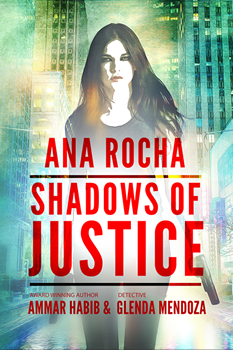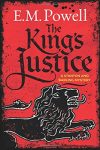

June 11 – 17: “How long does it take you to finish the first draft?”
 Stephen King has said a novel’s draft should be done in three months. this week ITW Members Paul Levine, Ammar Habib, Paul Sinor, Katee Robert, Lisa Von Biela, David Simms, E.M. Powell and T.J. O’Connor discuss how long it takes them to finish the first draft? Scroll down to the “comments” section to follow along!
Stephen King has said a novel’s draft should be done in three months. this week ITW Members Paul Levine, Ammar Habib, Paul Sinor, Katee Robert, Lisa Von Biela, David Simms, E.M. Powell and T.J. O’Connor discuss how long it takes them to finish the first draft? Scroll down to the “comments” section to follow along!
 Ammar Habib is a bestselling and award winning author who was born in Lake Jackson, Texas in 1993. Ammar enjoys crafting stories that are not only entertaining, but will also stay with the reader for a long time. Ammar presently resides in his hometown with his family, all of whom are his biggest fans.
Ammar Habib is a bestselling and award winning author who was born in Lake Jackson, Texas in 1993. Ammar enjoys crafting stories that are not only entertaining, but will also stay with the reader for a long time. Ammar presently resides in his hometown with his family, all of whom are his biggest fans.
 Lisa Von Biela began writing dark fiction just after the turn of the century. Her very first short story appeared in Greg F. Gifune’s small press ‘zine The Edge in 2002. After working in Information Technology for 25 years, Lisa dropped out of everything–including writing–to attend the University of Minnesota Law School. She graduated magna cum laude in 2009, and now practices law and writes in the Seattle area. She’s made up for lost writing time since law school and is now the author of the thriller novels THE GENESIS CODE, THE JANUS LEGACY, BLOCKBUSTER, BROKEN CHAIN, DOWN THE BRINK, and INCIDENTAL FINDINGS, as well as the horror novellas ASH AND BONE, SKINSHIFT, and MOON OVER RUIN. She is currently hard at work completing a cheery new novel about a mega-drought and a young family’s disastrous attempted escape through the Nevada desert.
Lisa Von Biela began writing dark fiction just after the turn of the century. Her very first short story appeared in Greg F. Gifune’s small press ‘zine The Edge in 2002. After working in Information Technology for 25 years, Lisa dropped out of everything–including writing–to attend the University of Minnesota Law School. She graduated magna cum laude in 2009, and now practices law and writes in the Seattle area. She’s made up for lost writing time since law school and is now the author of the thriller novels THE GENESIS CODE, THE JANUS LEGACY, BLOCKBUSTER, BROKEN CHAIN, DOWN THE BRINK, and INCIDENTAL FINDINGS, as well as the horror novellas ASH AND BONE, SKINSHIFT, and MOON OVER RUIN. She is currently hard at work completing a cheery new novel about a mega-drought and a young family’s disastrous attempted escape through the Nevada desert.
 David Simms lives in the Shenandoah Valley of Virginia with his wife, son, and animals. He works as a teacher, counselor, music therapist, ghost tour guide, book reviewer, and founding guitarist in the Killer Thriller Band/Slushpile band. Fear The Reaper is his second novel.
David Simms lives in the Shenandoah Valley of Virginia with his wife, son, and animals. He works as a teacher, counselor, music therapist, ghost tour guide, book reviewer, and founding guitarist in the Killer Thriller Band/Slushpile band. Fear The Reaper is his second novel.
 The author of 21 novels, Paul Levine won the John D. MacDonald Fiction Award and was nominated for the Edgar, Macavity, International Thriller, Shamus, and James Thurber prizes. He wrote 20 episodes of the CBS military drama JAG and co-created the Supreme Court drama First Monday. “To Speak for the Dead,” a Jake Lassiter legal thriller, was his debut novel. His most recent novel is the newly released “Bum Deal.”
The author of 21 novels, Paul Levine won the John D. MacDonald Fiction Award and was nominated for the Edgar, Macavity, International Thriller, Shamus, and James Thurber prizes. He wrote 20 episodes of the CBS military drama JAG and co-created the Supreme Court drama First Monday. “To Speak for the Dead,” a Jake Lassiter legal thriller, was his debut novel. His most recent novel is the newly released “Bum Deal.”
 Paul Sinor is a published novelist and a produced screenwriter. He has two mystery series in print. One features a PI who works out of a pool room in Atlanta, GA in the early 1950s and another series set in the Seattle, WA area. SENTIMENTAL JOURNEY is the second book in the Max Maxwell Seattle series. One book in both series have been nominated for the Georgia Author of the Year Award.
Paul Sinor is a published novelist and a produced screenwriter. He has two mystery series in print. One features a PI who works out of a pool room in Atlanta, GA in the early 1950s and another series set in the Seattle, WA area. SENTIMENTAL JOURNEY is the second book in the Max Maxwell Seattle series. One book in both series have been nominated for the Georgia Author of the Year Award.
 New York Times and USA TODAY bestselling author Katee Robert learned to tell her stories at her grandpa’s knee. Her 2015 title, The Marriage Contract, was a RITA finalist, and RT Book Reviews named it “a compulsively readable book with just the right amount of suspense and tension.” When not writing sexy contemporary and romantic suspense, she spends her time playing imaginary games with her children, driving her husband batty with what-if questions, and planning for the inevitable zombie apocalypse.
New York Times and USA TODAY bestselling author Katee Robert learned to tell her stories at her grandpa’s knee. Her 2015 title, The Marriage Contract, was a RITA finalist, and RT Book Reviews named it “a compulsively readable book with just the right amount of suspense and tension.” When not writing sexy contemporary and romantic suspense, she spends her time playing imaginary games with her children, driving her husband batty with what-if questions, and planning for the inevitable zombie apocalypse.
 E.M. Powell’s historical thriller Fifth Knight novels have been #1 Amazon and Bild bestsellers. Her new Stanton & Barling medieval murder mystery series starts with THE KING’S JUSTICE, which is due for release in 2018. She is a contributing editor to International Thriller Writers The Big Thrill magazine, blogs for English Historical Fiction Authors and is the social media manager for the Historical Novel Society. Born and raised in the Republic of Ireland into the family of Michael Collins (the legendary revolutionary and founder of the Irish Free State), she now lives in northwest England with her husband, daughter and a Facebook-friendly dog.
E.M. Powell’s historical thriller Fifth Knight novels have been #1 Amazon and Bild bestsellers. Her new Stanton & Barling medieval murder mystery series starts with THE KING’S JUSTICE, which is due for release in 2018. She is a contributing editor to International Thriller Writers The Big Thrill magazine, blogs for English Historical Fiction Authors and is the social media manager for the Historical Novel Society. Born and raised in the Republic of Ireland into the family of Michael Collins (the legendary revolutionary and founder of the Irish Free State), she now lives in northwest England with her husband, daughter and a Facebook-friendly dog.
 T.J. O’Connor is an international security consultant specializing in anti-terrorism and threat analysis. As a former military federal agent and anti-terrorism operative, T.J. has spent over 35 years in counterintelligence, national defense, and homeland security. T.J. has lived and worked around the world—life experiences that drive his novels—where he conducted terrorism investigations, protected some of American’s top leaders, and operated defensive programs to thwart terror attacks on America’s resources and its people. Today, T.J. lives outside Washington D.C. and provides security and anti-terrorism consulting to the private sector and a Washington-based think tank for vital homeland security programs. T.J. uses his life experience and real-world adventures to deliver his stories and raise the question—when will this happen? THE CONSULTANT is T.J.’s debut thriller with previous works of paranormal mysteries including: Dying to Know, Dying for the Past, Dying to Tell, and New Sins for Old Scores.
T.J. O’Connor is an international security consultant specializing in anti-terrorism and threat analysis. As a former military federal agent and anti-terrorism operative, T.J. has spent over 35 years in counterintelligence, national defense, and homeland security. T.J. has lived and worked around the world—life experiences that drive his novels—where he conducted terrorism investigations, protected some of American’s top leaders, and operated defensive programs to thwart terror attacks on America’s resources and its people. Today, T.J. lives outside Washington D.C. and provides security and anti-terrorism consulting to the private sector and a Washington-based think tank for vital homeland security programs. T.J. uses his life experience and real-world adventures to deliver his stories and raise the question—when will this happen? THE CONSULTANT is T.J.’s debut thriller with previous works of paranormal mysteries including: Dying to Know, Dying for the Past, Dying to Tell, and New Sins for Old Scores.
- LAST GIRL MISSING with K.L. Murphy - July 25, 2024
- CHILD OF DUST with Yigal Zur - July 25, 2024
- THE RAVENWOOD CONSPIRACY with Michael Siverling - July 19, 2024
